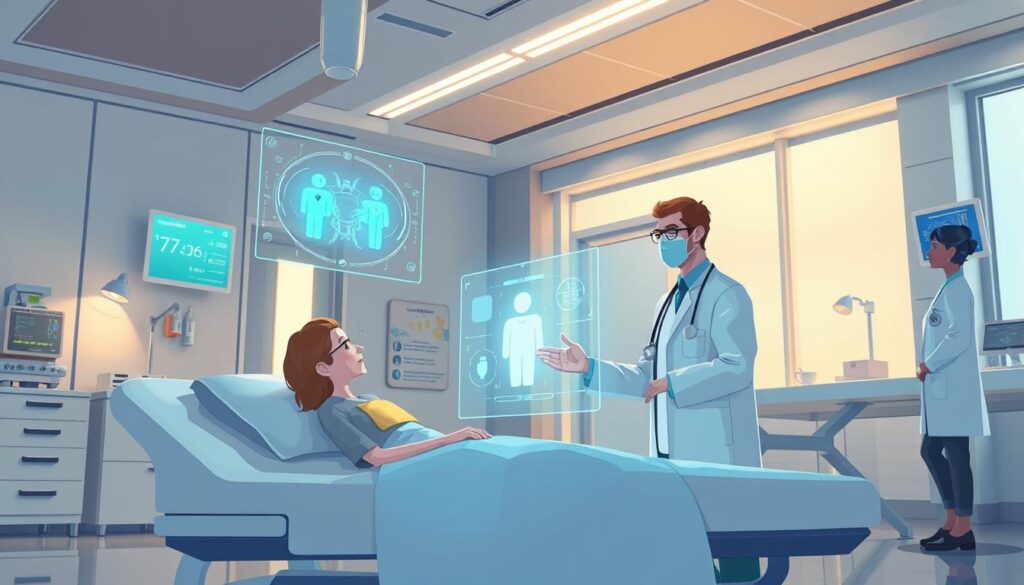As artificial intelligence (AI) changes healthcare, a big question is: how will it affect the doctor-patient relationship? A recent study in BMC Medical Informatics and Decision Making looks into this. AI could make healthcare better and more efficient, but some worry it might make doctors less human.
So, can AI make doctors more caring, or will it break the bond between doctors and patients?
Potential Benefits of AI in Healthcare
Artificial Intelligence (AI) is set to change healthcare in big ways. It brings many benefits, from AI medical decision support to AI bedside manner. These technologies are already showing their value in many areas.
One big plus of AI in healthcare is the time savings for doctors. AI can handle tasks like looking at medical images, writing down what patients say, and updating health records. This lets doctors spend more time with patients, building trust and improving care.
Time Savings for Doctors
AI tools make healthcare providers more efficient. For example, natural language processing (NLP) can write down what patients say right away. This lets doctors focus on understanding patients and giving them care that fits their needs.
AI also helps with medical images, spotting problems and suggesting what might be wrong. This helps doctors make better ai medical decision support.
With AI, doctors can spend more time connecting with patients. This builds ai and patient trust and leads to care that’s all about the patient. This is what makes doctor-patient relationships strong.
Impact of AI on the doctor-patient relationship in modern healthcare
The use of artificial intelligence (AI) in healthcare could change how doctors and patients interact. AI might help solve problems like not having enough time for patients. But, how AI will really affect this relationship is still a big question.
Some people worry that AI could make medicine less personal. They think AI might lead to doctors acting more like bosses, not helpers. Others fear AI could make doctors see more patients, not focus on each person’s needs.
But, others believe AI can actually make the doctor-patient relationship stronger. AI could help doctors do less paperwork and spend more time with patients. This could lead to deeper, more meaningful connections between doctors and their patients.
The role of AI in healthcare is complex and has many sides. As AI gets better, it’s important for healthcare to handle these changes carefully. They need to make sure AI improves, not lowers, the quality of care for each person.
Challenges of AI Integration
The healthcare industry is looking into AI’s benefits, but there are big ethical concerns. One major issue is making sure everything is clear and patients understand what’s happening. AI can be hard to understand, and doctors need to explain it well to patients.
There’s also a risk of AI making mistakes or giving wrong information. This can hurt patients’ ability to make choices. AI can also have biases, which can make things worse for certain groups and add to health care gaps.
Transparency and Informed Consent
Keeping ai and patient trust is key when using AI in health care. Patients need to know how AI is used in their care and give real consent. It’s important to talk openly and understand what AI can and can’t do to keep ai medical ethics and protect ai and medical data privacy.
By tackling these problems, health care can use AI in a way that helps patients. Finding the right mix of new tech and caring for patients is essential for AI’s success in health care.
Ethical Considerations
As AI becomes more common in healthcare, ethical questions grow. Who is to blame when AI makes bad choices for patients? We need clear rules for who is responsible and how to get consent.
There’s also worry that AI might ignore what patients really want. The danger of relying too much on AI and who should be held accountable are big issues. Ai medical ethics and ai and medical data privacy are key as we use AI more in healthcare.

Rules like the GDPR in the EU and GINA in the US help protect patient data. But, these laws need to keep up with AI’s growth to handle new ethical problems.
Doctors using AI must always put patients first. They should watch over AI, be open about its role in care, and make choices that benefit patients. This way, AI can help healthcare without losing sight of patient needs.
Maintaining the Human Element
As AI grows in healthcare, keeping the human touch in doctor-patient talks is key. Healthcare providers can use AI insights to help them, but also remember the patient’s needs and feelings. This way, care focuses on the patient, with everyone working together.
Patients are now more involved in their health, thanks to easy access to medical info. AI and patient trust are vital, as patients need to feel their input is valued. AI bedside manner is also important, helping doctors explain AI findings clearly and ethically.
Healthcare can use AI to help, but still keep the human element. This makes patients feel understood and in control of their health. It builds trust and helps solve ethical problems like informed consent and transparency.
Patient-Centered Care Approach
Artificial intelligence (AI) is changing healthcare, but keeping care patient-centered is key. This means working together with patients, their families, and doctors. It ensures AI insights are used with human knowledge and the patient’s needs.
Keeping care patient-centered helps doctors use AI without losing the human touch. This is vital for ai and patient trust and ai and medical data privacy. Patients need to trust that their needs are being met.
AI can make healthcare better and more efficient, but it also raises questions. A patient-centered care approach puts patients first in decisions. It makes sure patients know how AI helps them and respects their wishes.

As AI grows, healthcare must adapt to keep care patient-centered. This might mean more training and working closely with patients. It’s about using AI’s benefits while keeping care personal and caring.
Education and Training
AI is changing healthcare, and it’s key for providers to learn how to use these new tools. AI medical ethics and AI and medical data privacy are important. They need special education to use AI right in patient care.
Healthcare workers need to know what AI can and can’t do. This knowledge helps them understand AI’s insights and share them with patients. This builds trust and helps patients make better choices. With the right education and training, they can use AI without losing the personal touch in care.
Investing in education for healthcare providers is crucial. It helps AI and human skills work together better. This leads to better care and outcomes for patients. As AI grows in healthcare, education will be key to using it ethically and for the patient’s benefit.
Conclusion
Artificial intelligence (AI) is changing healthcare a lot. It’s important to think about how it affects the doctor-patient relationship. AI can make healthcare better and more efficient, but it also brings up big questions and challenges.
AI can make patients more involved in their care. This could make them trust their doctors more. But, AI’s role in healthcare might change how doctors and patients talk to each other. It’s key to keep the human touch in their relationship.
Healthcare needs to focus on the patient first. Doctors should know how AI works and what it can do. This way, they can explain AI’s role in care to patients. Working together, AI can make healthcare better for everyone.
